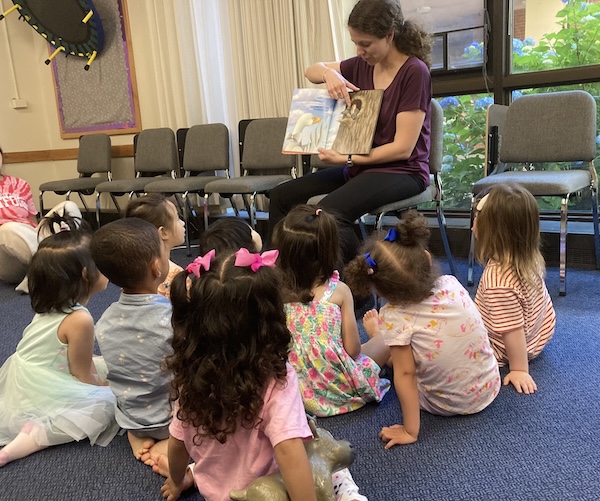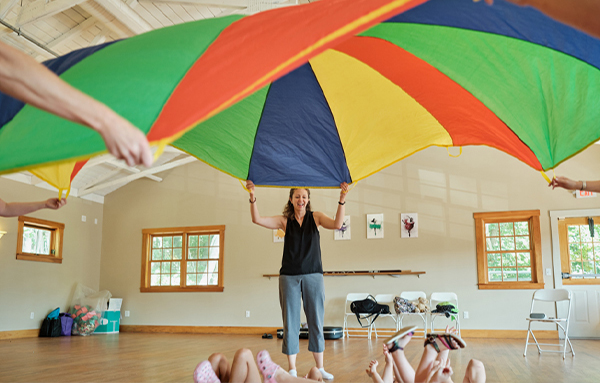The Hartt School Community Division offers music programs for students 0–5 years of age. Learn more about how your child can discover their love of music.
First Steps in Music

Created by John Feierabend, Ph.D., First Steps in Music (FSIM) is a developmentally appropriate and carefully researched early childhood music program for children between birth and five years old, taught by Mallory Kokus.
Designed for children and caregivers to attend together, these classes help children become tuneful, “beatful”, and artful. Students develop motor and language skills through songs and creative movement while encouraging constructive social interactions through group activities and games. This joyful experience ignites a musical spark for a lifetime of learning and builds up readiness for more formal music training.
Through singing, instrumental exploration, and games, children are given an appetite for music. In a playful manner, children develop sensory awareness, language, motor, creative and social skills along with gaining a wide repertoire of music. These sessions:
- inspire children to listen, feel, and move to music
- stimulate a child's imagination through songs and movement
- encourage constructive social interactions with other children and their families
- are fun for kids and parents
Classes
All classes are held in the University of Hartford's Fuller Music Building Room, F120. View an interactive campus map.
Fridays:
9:30 - 10:15 a.m. Ages 0 to 5
Sept.: 19, 26
Oct.: 3, 17, 24, 31
Nov.: 7, 14, 21*
*Make-up class in the event of weather cancellation / teacher absence
Tuition: $160
Saturdays:
9 - 9:45 a.m. Preschool (ages 3 to 5)
10 - 10:45 a.m. Toddler (ages 1 to 3)
11 – 11:45 a.m. Infant (ages 0 to 14 months)
Sept.: 20, 27
Oct.: 4, 18, 25
Nov.: 1, 8, 15, 22*
*Make-up class in the event of weather cancellation / teacher absence
Tuition: $160
Fridays:
9:30-10:15 a.m. Mixed Class (ages 0-5)
Jan. 16, 23, 30
Feb. 6, 20, 27
March 6, 13, 20*
*Make-up class in the event of weather cancellation / teacher absence
Saturdays:
9-9:45 a.m. Nursery/Preschool (ages 3 to 5)
10-10:45 a.m. Toddler (ages 1 to 3)
11-11:45 a.m. Infant (ages 0 to 14 months)
Jan. 17, 24, 31
Feb. 7, 21, 28
March 7, 14, 21*
*Make-up class in the event of weather cancellation / teacher absence
Fridays:
9:30-10:15 a.m. Mixed Class (ages 0-5)
April 24
May 1, 8, 15, 29
June 5, 12*
*Make-up class in the event of weather cancellation / teacher absence
Saturdays:
9-9:45 a.m. Nursery/Preschool (ages 3 to 5)
10-10:45 a.m. Toddler (ages 1 to 3)
11-11:45 a.m. Infant (ages 0 to 14 months)
April 25
May 2, 9, 16, 30
June 6, 13*
*Make-up class in the event of weather cancellation / teacher absence
Select Tuesdays:
11-11:45am (ages 0-5)
July 1, 8, 22, 29
Class Format

Children enrolled in First Steps in Music begin their music time each week with 15 minutes of "free music play," during which children are free to explore a variety of rhythm instruments.
A rocking horse and a small trampoline are also available to children, while their parents accompany them with bouncing rhymes. Parents are encouraged to play or sing along with their child, always allowing the child to take the lead in the musical exploration. At the end of the "free music play" time. the instruments are gathered and put out of sight.
Following the music play time, group time commences as the children sit in a circle on the floor with their parents. The teacher will lead families in a series of seated activities including bounces, tickles, and fingerplays. We will warm up our bodies with action songs and movement explorations, then move into circle songs and games. We will have fun dancing together to recordings of classical music. Each class will conclude with a calm listening activity, either a lullaby or a Song Tale from the First Steps in Music curriculum.
The program hopes to guide children in becoming:
- Tuneful (Tuneful people can sing Happy Birthday to their friend or a lullaby to their baby.)
- “Beatful” (“Beatful” people can move with the beat in duple and triple meters, clap in time at a rock concert, and dance at a wedding.)
- Artful (Artful people can respond expressively to various artforms; they can appreciate and be moved by a beautiful piece of music.)
Age Ranges
Infant classes will feature songs and rhymes perfect for babies held in the loving arms of a grown-up! We will have fun singing bounces, tickles, and finger wiggles. Peek-a-boo games are a must! Grown-ups will move to circle songs and recordings of classical music while holding their baby. Class will end with a gentle, relaxing lullaby.
The infant years are crucial for musical development. Infants are not "too young" for music; they have been active listeners since before they were born! Activities learned at class are perfect additions to your "parenting toolbox" - songs to help soothe a fussy baby, relax a tired baby, or engage with your baby at playtime.
Questions?
Please call the main office at 860.768.4451 or email us at harttcomm@hartford.edu.